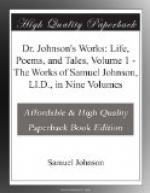THE HISTORY
OF
RASSELAS, PRINCE OF ABISSINIA.
PREFATORY OBSERVATIONS.
The following incomparable tale was published in 1759; and the early familiarity with eastern manners, which Johnson derived from his translation of father Lobo’s travels into Abissinia, may be presumed to have led him to fix his opening scene in that country; while Rassela Christos, the general of sultan Sequed, mentioned in that work, may have suggested the name of his speculative prince. Rasselas was written in the evenings of a single week, and sent to the press, in portions, with the amiable view of defraying the funeral expenses of the author’s aged mother, and discharging her few remaining debts. The sum, however, which he received for it, does not seem large, to those who know its subsequent popularity. None of his works has been more widely circulated; and the admiration, which it has attracted, in almost every country of Europe, proves, that, with all its depression and sadness, it does utter a voice, that meets with an assenting answer in the hearts of all who have tried life, and found its emptiness. Johnson’s view of our lot on earth was always gloomy, and the circumstances, under which Rasselas was composed, were calculated to add a deepened tinge of melancholy to its speculations on human folly, misery, or malignity. Many of the subjects discussed, are known to have been those which had agitated Johnson’s mind. Among them is the question, whether the departed ever revisit the places that knew them on earth, and how far they may take an interest in the welfare of those, over whom they watched, when here. We shall elsewhere have to contemplate the moralist, standing on the border of his mother’s grave, and asking, with anxious agony, whether that dark bourn, once passed, terminated for ever the cares of maternity and love[a]. The frivolous and the proud, who think not, or acknowledge not, that there are secrets, in both matter and mind, of which their philosophy has not dreamed, may smile at what they may, in their derision, term such weak and idle inquiries. But on them, the most powerful minds that ever illuminated this world, have fastened, with an intense curiosity; and, owning their fears, or their ignorance, have not dared to disavow their belief[b].
It is not to be denied, that Rasselas displays life, as one unvaried series of disappointments, and leaves the mind, at its close, in painful depression. This effect has been considered an evil, and regarded even as similar to that produced by the doctrines of Voltaire, Bolingbroke, and Rousseau, who combined every thing venerable on earth with ridicule, treated virtue and vice, with equal contemptuous indifference, and laid bare, with cruel mockery, the vanity of all mortal wishes, prospects, and pursuits. Their motive, for all this, we need not pause, in this place, to examine. But a distinction may be made between




